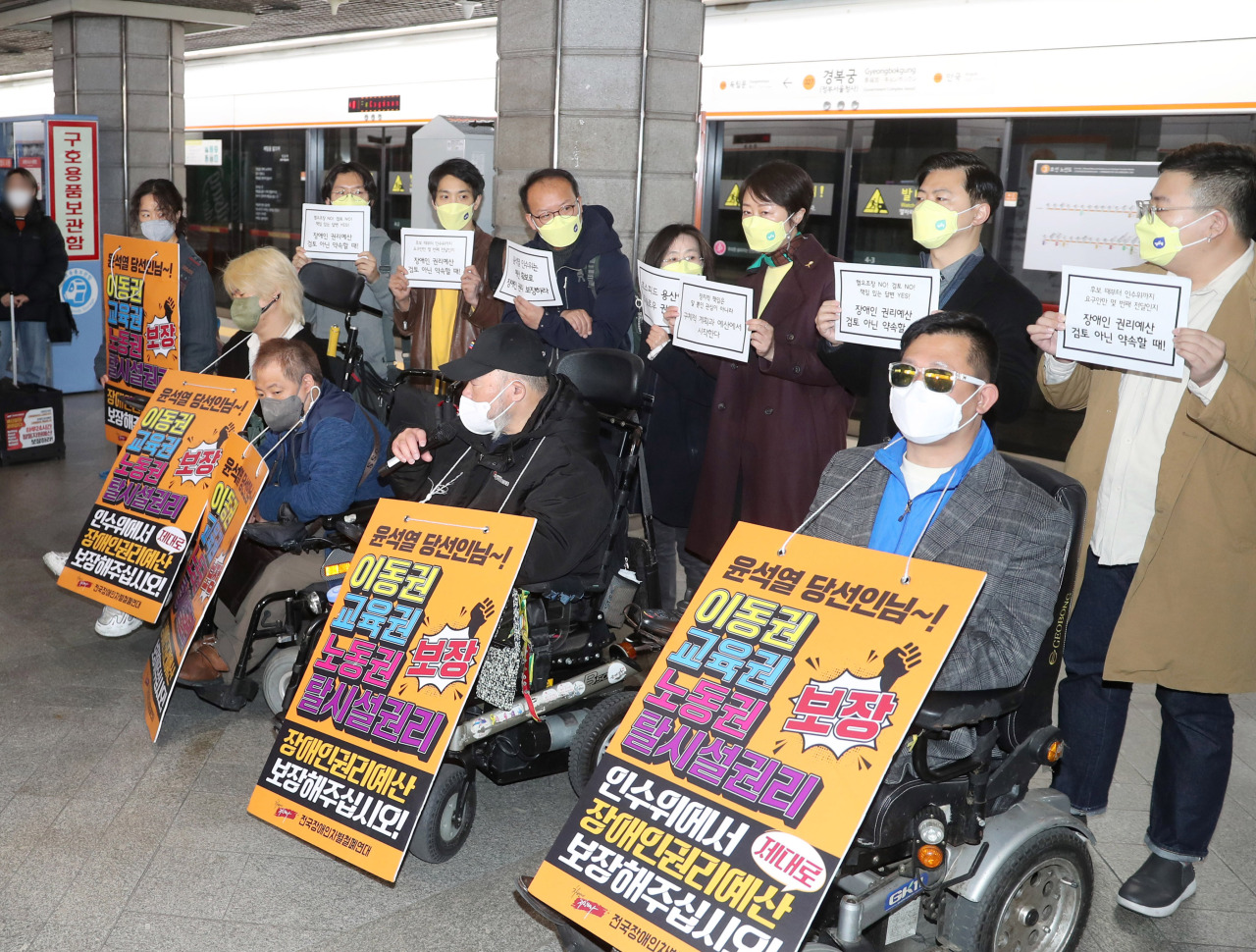An advocacy group for the disabled said Tuesday it would halt its protests in the subway in response to a request by the presidential transition committee, which vowed to “make efforts” to meet their demands.
The presidential transition committee met with the protest organizer, the Solidarity Against Disability Discrimination, in the morning, listening to their concerns and asking them to halt the subway protests, which disrupted morning commutes and other travel.
Hours after the meeting with the committee, the advocacy group released a statement saying they would suspend the protests in the subway. But they said their members would continue the rally by shaving their heads one by one every day from Wednesday until April 20, urging the committee do be responsible in drawing up a budget to support the rights of disabled people and four major bills.
During the meeting with the transition committee in the morning, Park Kyung-seok, leader of the advocacy group, demanded a government budget dedicated to improving welfare for the disabled and improved subway access “that we have been shouting for more than 300 days since last year.”
He also hoped that people with severe disabilities would be allowed to work and participate in the labor market.
Choi Yong-gi, head of the Korea Council of Centers for Independent Living and who has physical disabilities, said it was psychologically challenging for many severely disabled people to take the subway in the morning. “Improvements have to be made in areas where the right to move has not been guaranteed for 21 years.”
Rep. Lim Lee-ja of the transition committee said the right to protest are “natural rights,” vowing to make efforts to improve their quality of life and communicate with related organizations.
The meeting came 15 days after the advocacy group demanded to speak with the committee.
Since Thursday, the association has been conducting subway protests, calling on the government to guarantee the rights of the disabled and improve access.
They also demanded the installation of elevators at all subway stations, the mandatory introduction of low-floor buses, expansion of government subsidies for special transportation such as call taxis for the disabled, and expansion of assistance for lifelong education facilities for the disabled.
Amid the ongoing protest, People Power Party leader Lee Jun-seok continued to criticize those protesting during rush hour, saying they are continuing “illegal protests from an uncivilized point of view” that their claims will be carried out only when they cause unhappiness and inconvenience to the greatest number of people.
“If this is tolerated, society will become an unusual arena of competition to cause the greatest fear and inconvenience rather than rational discussion and dialogue on all issues,” he said.
Lee said Sunday that the association should “abandon self-righteousness” and throw away their obsession that they can make “unreasonable demands” by “taking Seoul citizens hostage” if their proposals are not accepted.
In response to criticism about using the word “hostage,” Lee reiterated on Tuesday that there was no need for an apology at all in using the expression.
The Democratic Party and the Justice Party lashed out at Lee, saying he was inciting hatred.
Bae Jae-jeong, an emergency committee member of the Democratic Party, said the main task of politics is to mediate and compromise conflicts. “The language of politicians who do not empathize brings discrimination, hatred and violence.”
Park Ji-hyun, chairperson of the Democratic Party’s joint emergency committee, said Monday their demand for the right to movement is to realize constitutional rights. “We need to properly listen to why disabled people complain on the subway.”
“There is already a bill proposed by the ruling and opposition parties. We need to process the bill and work together to secure a budget to guarantee the rights of the disabled,” she said.
Rep. Jang Hye-young of the Justice Party, who visited the protests, expressed “deep regret” that the leader of the ruling party made insulting remarks.
Former lawmaker Na Kyung-won, who served as the floor leader for the People Power Party, also criticized Lee, saying, “Guaranteeing the right to move is the survival of the disabled.”
“While raising a disabled child, I felt so frustrated and confronted with a reality that if the law and system are not in place, I have no choice but to rely on the protests,” said Na, whose daughter was born with Down syndrome.
By Shin Ji-hye (
shinjh@heraldcorp.com)








